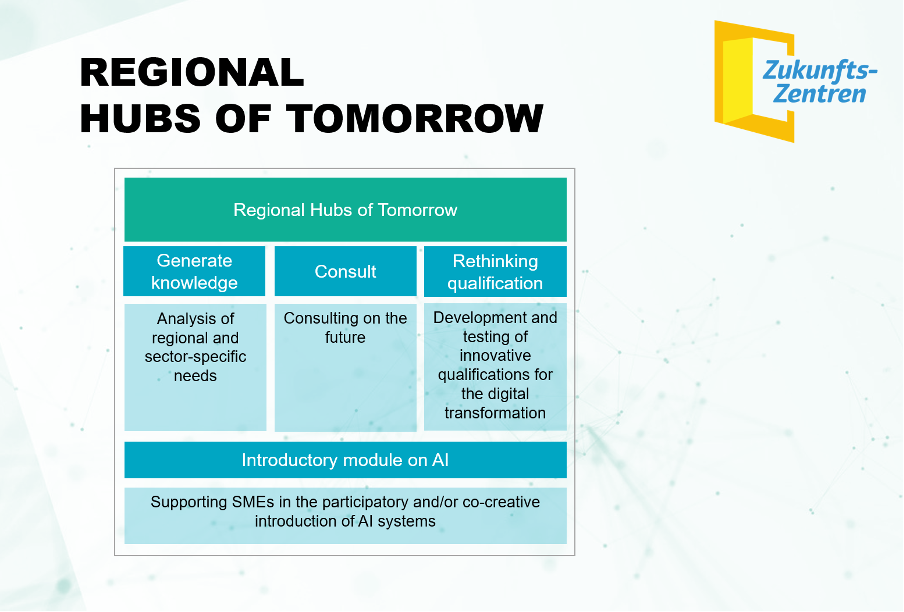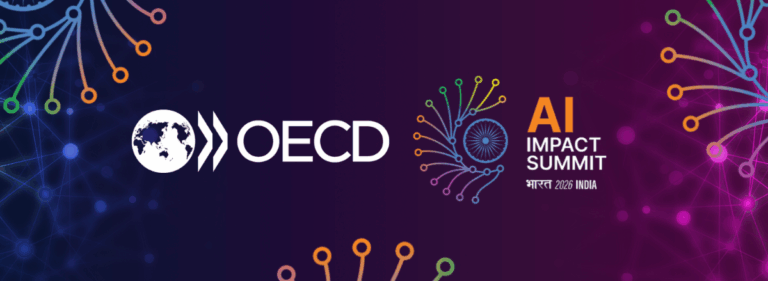Germany’s human-centred approach to AI is inclusive, evidence-based and capacity-building
Artificial intelligence (AI) is a revolutionary technology with the potential to boost economic growth and create productivity gains. It also has the potential to profoundly restructure labour markets and working conditions. From a governmental perspective, policies need to focus on maximising the potential for the economy and entrepreneurial activities. Policies should focus on the potential to make work better, increase productivity and foster growth. Ultimately, AI technologies are not relevant for their own sake, but as a means for making lives better.
In 2018, we introduced a national AI strategy to foster growth and competitiveness. It also aims to ensure responsible and trustworthy development of AI. The three ministries who are responsible for the strategy – the Federal Ministry of Labour and Social Affairs, the Federal Ministry of Education and Research and the Federal Ministry of Economic Affairs and Energy – have laid out a roadmap for Germany’s approach to AI. It is a consultative process with a diverse set of stakeholders.
The German AI Strategy takes a holistic approach in pursuit of three central goals:
- Secure Germany’s future competitiveness while making #Germany and #Europe leading locations for the development and application of AI technologies;
- Ensure that AI use and development are responsible and focused on the common good;
- Embed AI ethically, legally, culturally and institutionally through broad societal dialogue and active political efforts.
As of 2021, we have dedicated five billion Euros available to implementing the AI strategy, including two billion euros dedicated to economic stimulus and a “future technologies” package that responds to the pandemic. The scale of allocated resources underlines the importance that Germany attributes to AI.
In December 2020, we updated our national AI strategy in response to recent developments in the field of AI. Seven thematic expert forums from the fields of business and industry, science, policy-making and society informed the update. Their work takes into account relevant recommendations from the Parliamentary Study Commission on AI, published in autumn 2020.
Policies to enhance human capacity and ensure a human-centred approach to AI
To be beneficial to the future of our societies, the newly updated strategy states that AI applications must augment and support human performance. From this perspective, the government’s mission is to build the necessary trust among citizens and equip them with the necessary training and skills to interact confidently and comfortably with AI in a professional context. This makes it crucial to invest just as much in people as in technology. The OECD AI Principle 2.4 on Building AI human capacity forms the very base of that task.
With the “National Skills Strategy” that began in 2019, we are started implementing a set of instruments that are broadly targeted to promote workforce skills as demographic, digital and ecological progress. This Strategy pushes the enhancement of continuing education and training to the forefront as a means for securing employment and enabling everyone to participate actively in the labour market. This includes monitoring AI-specific skills and developing AI-supported applications.
AI-literacy
As many users are not aware of the near-omnipresence of AI, they tend to overestimate the risks and underestimate the opportunities. That is why “AI literacy” is essential if Europe is to maintain its leading role in the world regarding AI technologies. The German Minister for Economic Affairs and Energy, Peter Altmaier, has taken on the patronage for a free online course ‘Elements of AI’, which was developed by the University of Helsinki. The course is available in German and users can follow it at their own pace without previous experience in coding or special maths skills.
Political action on AI must be evidence-based
As a relatively new technology, there are few robust databases to support the task of mapping out the developing AI landscape in Germany. This is especially true when it comes to the impact of AI on work and society. Still, policy makers need this kind of evidence to make informed decisions. A wide range of policies and initiatives have been put in place to cover a broad set of stakeholders. This will build an evidence base and support SMEs.
The Federal Ministry of Labour and Social Affairs has therefore established the Observatory for Artificial Intelligence in the World of Work in March 2020. Its overall objective is to contribute to inclusive AI policies by analysing the effects and technological consequences of AI on work and society. The Observatory is contributing to this effort by developing indicators and commissioning research projects. In addition, it facilitates continuous exchanges between experts in the field of human-machine interaction. The overarching goal here is to analyse trends and foresee important developments more effectively.
The German AI Observatory works closely with the OECD’s AI Observatory and other partners to develop indicators for AI in society. Two examples include the perceived consequences for working conditions by the deployment of AI and the relative AI skills penetration across countries.
The OECD AI programme on Work, Innovation, Productivity and Skills (AI-WIPS), which is supported by the Federal Ministry of Labour and Social Affairs, contributes to the developing this evidence base, with its objective to produce internationally comparable data. The project produces several other outcomes such as comparable data, in-depth analyses and opportunities for international dialogue. Its concrete policy assessments cover the effects of AI on labour markets and societies. The results of its research will shape the global debate on AI and contribute to the Global Partnership on AI (GPAI)’s work, thereby promoting OECD AI Principle 2.5 on International Cooperation for Trustworthy AI.
Increased support structures to promote the human-centred transfer of AI in SMEs
Work has always given people a sense of purpose. For many people, work is an important part of their identity. Therefore, workers and their companies need to be involved in designing the future of work.
More specifically, people want to have a say when AI gets introduced into their workplaces. This participation creates trust, and that is the prerequisite for innovation and sustainability. Thus, the digital empowerment of individuals and entire companies as organisations is crucial.
Digital empowerment in the workplace also means equipping SMEs and their employees with AI skills. A study conducted by the Federal Ministry of Economic Affairs and Energy and the Leibniz Centre for European Economic Research shows that in 2019, only 5.8 % of German businesses were making use of AI technologies. The study attributes this to a lack of AI-specific expertise in SMEs. We have therefore developed a range of initiatives to train and equip SMEs and their employees with AI capacities and to design processes for the human-centred introduction of AI in companies.
Hubs for Tomorrow
The Hubs for Tomorrow (German: Zukunftszentren) aim at supporting SMEs in the adoption of digital technologies and AI-based systems. The hubs use a participatory and co-creative method so that businesses can design processes with their employees. SMEs, employees and the self-employed are empowered in their ability to shape change through needs-based knowledge acquisition and the development and testing of innovative learning approaches.
There are a few challenges in the process. One involves making knowledge about AI systems’ operation modes available for company-specific applications. Another is designing implementation processes that are participation-oriented and impart necessary skills.

Experimentation and Learning Spaces
The policy initiative Experimentation and Learning Spaces (German: Experimentierräume) are located within companies and administrations. They enable organisations and their employees to develop and test solutions for the human-centred introduction and implementation of AI processes in the workplace. These spaces assist in the implementation and transfer of AI technologies, and also act as information platforms and are supporting SMEs in the challenges of the digital transformation. Researchers are monitoring the processes, challenges and opportunities to develop a scientific method that can be applied to other businesses.
AI in the service of diversity
One such learning space, the KIDD project (AI in the service of diversity), starts from the assumption that algorithms can in fact discriminate. Digital systems should consider different perspectives and involve people with diverse backgrounds early in the design process. Participating companies test co-creative processes to introduce a digital system, thereby involving a diverse set of employees and experts. The ultimate goal is to develop a standardised “KIDD process” that avoids discrimination and enables a fair, transparent and understandable human-centred application of digital systems in business.
AI-Coaches
While German AI researchers are among the best worldwide, the transfer of results from universities into the economy proves challenging. This is partly because the economic profile of the German mid-tier (Mittelstand) is extremely diverse: family-owned companies that were established generations ago, trendy start-ups, traditional crafts firms, self-employed people and service providers, retailers and freelancers, pioneering high-tech companies, regional suppliers and global players.
To make new technologies like AI known among SMEs and to make the entry of those technologies into SMEs as easy as possible, AI-Coaches work directly with SMEs (over 3,400 in May 2020) to raise awareness of the technological and economical potentials of AI. The responses have been overwhelming. This goes to show the great interest regarding AI among SMEs.
At the heart of the German AI strategy a broad social dialogue and AI for the common good
Just like SMEs, it is crucial to support civil society in developing AI skills and competencies to harness the potential of AI for good. Furthermore, involving civil society can foster widespread acceptance and trust in technology among the population. With this in mind, the Policy Lab Digital, Work & Society at the German Federal Ministry of Labour and Social Affairs launched the Civic Innovation Platform (CIP) in September 2020, with a different approach to fostering AI capacity. CIP aims to promote innovative AI applications for the common good through a holistic funding approach with networking and collaboration at its core. Stakeholders from different backgrounds can jointly submit their drafts for the development of a common-good oriented AI application via an online platform. Participants can come from diverse entities such as social organisations, municipalities, start-ups, NGOs but also individual citizens. Up to now, these stakeholders have been given little consideration in the funding processes. By including them, CIP is widening the set of recipients and ensuring an innovative approach to the development of human-centred AI.
All of these policies have followed our national AI strategy and ensure the human-centred use of AI. Our next step will be to institutionalise evaluation processes and establish best practices.
Further reading:
- The German AI Strategy, published in Nov 2018
- The Update of the German AI Strategy, published in Dec 2020:
- The Policy Lab Digital, Work & Society of the Federal Ministry of Labour and Social Affairs
- The German Observatory for Artificial Intelligence in Work and Society
- Press release by the Federal Ministry of Economic Affairs on the AI diffusion in German Mittelstand, published March 2020
- Background information on Experimentation and Learning Spaces





































